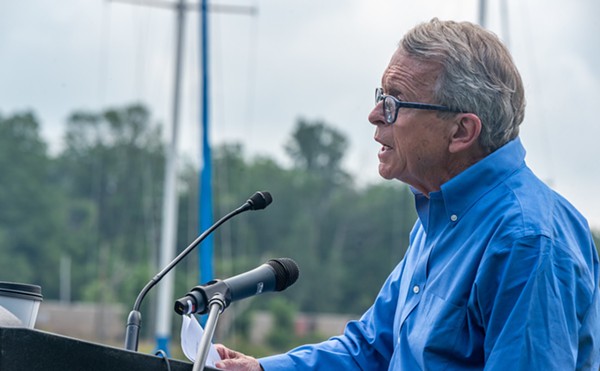"What does it take for the administration to stop paying lip service to our communities?" he asks attendees crammed into the overcrowded pews and sprawled across the aisles. "Does it take someone getting physically hurt? Does it take a death? [...] From these incidents, it is clear that the administration has failed to show an effort to lead or guide."
Students, community members, and faculty are punctuating Harding's fiery disquisition with big whoops and shrieks of support, their applause drowning out half his sentences.
The indictment continues with the third student panelist, Donnay Edmund. "Since when does saying 'I'm in solidarity' make you an active participant in challenging the stifling and suffocating oppressive forces that have attempted to dismantle communities?" she demands. "People here have drafted and re-drafted ideas that the administration should implement if their imagination keeps failing."
After the student and faculty speeches, when Krislov and deans Eric Estes and Alison Williams join the student and faculty panelists on stage for an open Q&A with the audience, tension in the room escalates, some students turning in their seats to silently mouth "Oh, shit!" to their friends.
When one student inquires about the panelists' personal definitions of "solidarity," Krislov's milquetoast response elicits several groans. Another student asks, with more than a hint of incredulity, "What do you have to say for yourselves?" In response, Krislov cites the college's investigative forays and "resource" expenditure, as well as their "community-building" efforts.
Harding's brazen dismissal of the president's reply shocks many and prompts another round of applause: "In terms of the community-building that you've been involved in, I'm really curious as to what you've learned from that. I haven't really seen you be involved in community-building."
"Well..." Krislov's pregnant pause prompts a small chorus of mocking "Wells" echoed in the audience. "Now, I do think we should try to be respectful," Krislov ventures. He remarks that he's been trying to work with students and faculty to attain a sense of "how people are feeling," concluding with, "We've been listening to students and also faculty and staff as well."
Students present at A-house on Monday morning, however, pose an alternative narrative, one that interrogates the very origins of the "Day of Solidarity," roundly hailed by the media as a judicious response to the episodes of racist, anti-Semitic, sexist, and homophobic aggression on campus.
Students contend that not only has the college not properly redressed previous occurrences of hate-inspired activity, but that administrative response Monday morning was initially non-compliant with student demands: after hours of negotiations, students in A-house essentially threatened a walk-out.
The deans, who had all either arrived at the A-house lounge or were in touch via speaker phone, likely sensed a mounting PR disaster, and agreed shortly after 5 a.m. to suspend classes.
Two days after the Day of Solidarity, students lounging in the Multicultural Resource Center's cozy office, lined with sofas and tables of food, express dissatisfaction with media coverage of Monday's events, objecting to laudatory reports of administrative initiative in hosting the Day of Solidarity in lieu of classes.
"The important thing to know is that this was student-driven," insists Ellison. "We feel like we're running this campus on our own."
"The Day of Solidarity was a result of student endeavors and student demands," affirms Miata Rogers. "We read a lot of newspaper articles that just mentioned the fact that the president canceled classes." Both Rogers and Ellison agree that without agitation from the Africana community in the A-house lounge Monday morning, "classes would have definitely been in session."
Students drafted plans for a barricade of academic buildings when it became clear that the deans were hesitant to adopt the Africana Studies department's plans to suspend classes for a teach-in. Dean Sean Decatur reportedly demurred that canceling classes would "disrupt" the college's "commitment to learning."
Many A-house residents are astonished by the nasty, persistent rumor-seized upon by recent media reports and perpetuated by the Oberlin Police Department—that the KKK sighting was a "hoax" or a "scare," that the student who reported the Klan figure had in fact witnessed a "pedestrian wrapped in a blanket."
As the student quipped to the Oberlin Review in response to the police report, "So a blanket is going to magically unfold while the wind is blowing and cover their entire body and form a point at the top of their head?"
"The information that has been presented is misguided and incorrect," says Diop, who believes that the administration and campus security haven't been transparent enough in their investigation of the event, failing to dispel or confirm the "blanket theory" to the media.
"It undermines our experience," agrees Daisy Peele, one of the coordinators of the A-house working groups and co-chair of Oberlin's Black Student Union. "People just think we're overreacting. [The student who reported the sighting] is a very serious, trustworthy person—she wouldn't just make that up. It just reflects the lack of support that we're getting."













